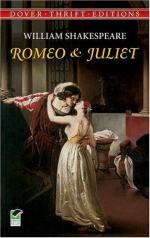|
This section contains 6,871 words (approx. 23 pages at 300 words per page) |

|
SOURCE: "'We Were Born to Die': Romeo and Juliet," in Comparative Drama, Vol. 15, No. 1, Spring 1981, pp. 54-71.
In the following essay, Carroll explores the juxtaposition of love and death in Romeo and Juliet, viewing the ending of the play as "positive" in that it eternalizes the title characters' love rather than ironically presenting their demise.
While Romeo and Juliet consummate their marriage offstage, their one night in the sheets of love is shaded by the ghostly presence of winding sheets. Tybalt's death hangs over Verona, as old Capulet says to Paris:
Look you, she lov'd her kinsman Tybalt dearly,1
And so did I. Well, we were born to die.
'Tis very late, she'll not come down to-night.'
(III.iv.3-5)
Indeed she won't, for she is dying sexually above even as her father pronounces his platitudes and arranges her hasty marriage to Paris. Juliet governs her own...
|
This section contains 6,871 words (approx. 23 pages at 300 words per page) |

|


